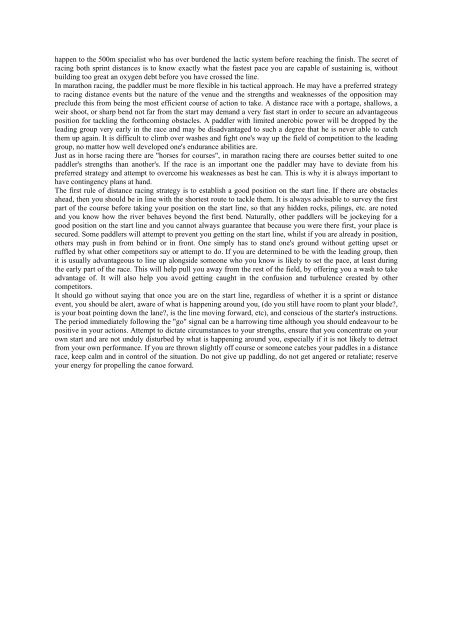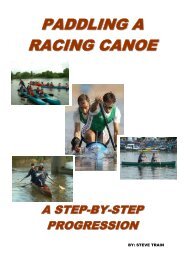The Science of Canoeing By Richard Cox
The Science of Canoeing By Richard Cox
The Science of Canoeing By Richard Cox
Create successful ePaper yourself
Turn your PDF publications into a flip-book with our unique Google optimized e-Paper software.
happen to the 500m specialist who has over burdened the lactic system before reaching the finish. <strong>The</strong> secret <strong>of</strong><br />
racing both sprint distances is to know exactly what the fastest pace you are capable <strong>of</strong> sustaining is, without<br />
building too great an oxygen debt before you have crossed the line.<br />
In marathon racing, the paddler must be more flexible in his tactical approach. He may have a preferred strategy<br />
to racing distance events but the nature <strong>of</strong> the venue and the strengths and weaknesses <strong>of</strong> the opposition may<br />
preclude this from being the most efficient course <strong>of</strong> action to take. A distance race with a portage, shallows, a<br />
weir shoot, or sharp bend not far from the start may demand a very fast start in order to secure an advantageous<br />
position for tackling the forthcoming obstacles. A paddler with limited anerobic power will be dropped by the<br />
leading group very early in the race and may be disadvantaged to such a degree that he is never able to catch<br />
them up again. It is difficult to climb over washes and fight one's way up the field <strong>of</strong> competition to the leading<br />
group, no matter how well developed one's endurance abilities are.<br />
Just as in horse racing there are "horses for courses", in marathon racing there are courses better suited to one<br />
paddler's strengths than another's. If the race is an important one the paddler may have to deviate from his<br />
preferred strategy and attempt to overcome his weaknesses as best he can. This is why it is always important to<br />
have contingency plans at hand.<br />
<strong>The</strong> first rule <strong>of</strong> distance racing strategy is to establish a good position on the start line. If there are obstacles<br />
ahead, then you should be in line with the shortest route to tackle them. It is always advisable to survey the first<br />
part <strong>of</strong> the course before taking your position on the start line, so that any hidden rocks, pilings, etc. are noted<br />
and you know how the river behaves beyond the first bend. Naturally, other paddlers will be jockeying for a<br />
good position on the start line and you cannot always guarantee that because you were there first, your place is<br />
secured. Some paddlers will attempt to prevent you getting on the start line, whilst if you are already in position,<br />
others may push in from behind or in front. One simply has to stand one's ground without getting upset or<br />
ruffled by what other competitors say or attempt to do. If you are determined to be with the leading group, then<br />
it is usually advantageous to line up alongside someone who you know is likely to set the pace, at least during<br />
the early part <strong>of</strong> the race. This will help pull you away from the rest <strong>of</strong> the field, by <strong>of</strong>fering you a wash to take<br />
advantage <strong>of</strong>. It will also help you avoid getting caught in the confusion and turbulence created by other<br />
competitors.<br />
It should go without saying that once you are on the start line, regardless <strong>of</strong> whether it is a sprint or distance<br />
event, you should be alert, aware <strong>of</strong> what is happening around you, (do you still have room to plant your blade?,<br />
is your boat pointing down the lane?, is the line moving forward, etc), and conscious <strong>of</strong> the starter's instructions.<br />
<strong>The</strong> period immediately following the "go" signal can be a harrowing time although you should endeavour to be<br />
positive in your actions. Attempt to dictate circumstances to your strengths, ensure that you concentrate on your<br />
own start and are not unduly disturbed by what is happening around you, especially if it is not likely to detract<br />
from your own performance. If you are thrown slightly <strong>of</strong>f course or someone catches your paddles in a distance<br />
race, keep calm and in control <strong>of</strong> the situation. Do not give up paddling, do not get angered or retaliate; reserve<br />
your energy for propelling the canoe forward.



